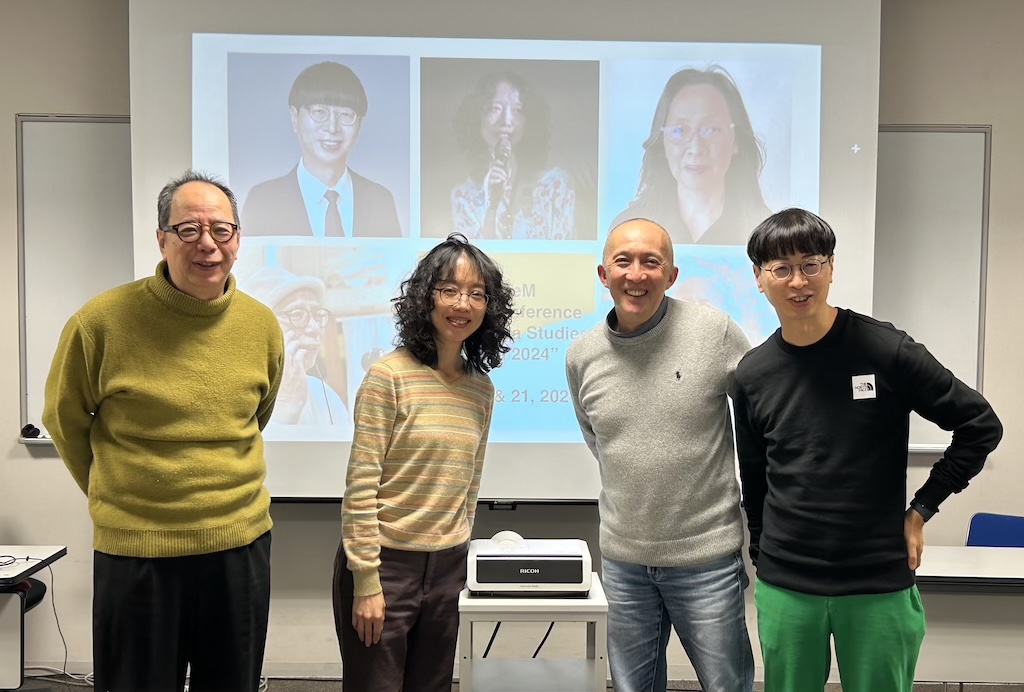(English follows Japanese)
2024年1月20日(土)、21日(日)の2日間にわたり、「INSTeM Online Conference “Post-Media Studies in Asia 2024”(アジアにおけるポストメディア研究2024)」と題された国際会議をオンラインで開催した。基調講演には、香港中文大学のアンソニー・ファン(馮應謙)教授、国立台湾師範大学のエヴァ・ツァイ(蔡如音)教授、ロンドン大学ゴールドスミスカレッジの玉利智子上級講師を招聘し、INSTeMからは研究部サブディレクターで関西大学教授の水越伸が基調講演者として参加した。また研究部コーディネーターで東京藝術大学教授の毛利嘉孝が総括を担当した。会議は基本的にはオンラインで開催されたが、基調講演者は、東京藝術大学千住キャンパスの配信用の部屋に集合し、東京から配信、議論に参加した。使用言語は英語とし、公募(Call for Papers)形式による国際会議である。
2023年12月にファン、ツァイ、水越、毛利の4人が、インターネットを通じて送られてきた要旨(abstract)と略歴(CV)をもとに審査を行い、審査の結果15人(組)の報告者を選出した。報告者たちは、日本のほか、中国、オランダ、アメリカ、タイといった国からオンラインで参加し、テーマに応じて「Post Media Theory and Media Practices (ポストメディア理論とメディア実践)」「Feminist Post-Media(フェミニスト的なポストメディア)」「Culture and Politics in the Digital Sphere (デジタル圏における政治と文化)」「Music and Sound Culture in the Post-Media Age(ポストメディア時代の音楽とサウンド文化)」の4つのセッションにわかれ、それぞれ興味深い報告を行った。報告者に加えて当日は45名が一般参加者として登録し、常時40人前後がオンラインで議論に参加した。
「ポストメディア」とは、もともと1980年代の終わりにフランスの哲学者、精神分析者であるフェリックス・ガタリが提起した概念である。インターネットがまだ普及する前の時代にガタリは、フランスで普及しつつあったミニテルを念頭に置きながら、新聞やラジオ、テレビのような一方通行のマスメディアではなく、双方向型のメディアの到来に期待し、それがそれまでになかった新しい政治の様式、民主主義の形式をもたらすと主張した。
それから40年近くが経ち、インターネットの発展を実際に経験した私たちは、双方向型の社会的、政治的、文化的な大きな影響とともに、その否定的な側面、問題点やダークサイドも目撃してきた。登場した時にはバラ色の未来を約束するかのように見えたインターネットは、社会や経済の発展に貢献する一方で、同時に多くの問題も引き起こしてきたのである。この国際会議は、80年代のガタリの議論をあらためて見直すことによって、この40年間のメディアの変化を批判的に再検討しようというものだった。
基調講演では、ファン氏はデジタルメディアに対するより批判的な見方(レンズ)の必要性を指摘した上で、フーコーが指摘する「規律=訓練社会」からドゥルーズが言う「管理社会」へと社会が移行していることを主張した。この「管理社会」では、プラットフォーム資本主義というデジタルメディアのインフラ企業を中心とした新しい資本主義が中心となり、より巧妙な形で私たちの生活が管理、制御されるようになるというのである。ファン氏によれば、それに対する批判はより日常的なメディアの実践を通じてなされるべきであるという。
ツァイ氏は、呉明益(ウー・ミンイ)の小説をある種のメディア論のテキストとして読むことを通じて、デジタルメディア研究の問題の拡張を試みた。ツァイ氏は、より大きな自然の生態系やエコロジー、動物や植物、生物や身体の問題として捉え直すことを通じて、現在インフラストラクチャーやプラットフォームが支配しているかのようにみえるメディア環境そのものを別の言語で語る方法、新しいメディア論を提案したのである。
2つの基調講演は全く異なったアプローチであるが、現在のメディア研究の輪郭とその可能性、そして問題点を提起している。このことは、AIやアルゴリズム、身体など従来のメディア研究では捉えきれなかった新しい領域の存在論を問う玉利氏の議論とも響き合っている。
同様に各報告のテーマも多様だった。ここで全てを要約し、ひとつの傾向を示すことは難しい。けれども、デジタルメディアをめぐる現状とメディア研究に、より批判的な視点を導入することが必要とされているという点で、多くの報告者に一定の合意が見られたことが印象に残った。その上で、デジタルメディア研究が狭義のメディアや技術の研究にとどまることなく、福祉やケア、ジェンダーやセクシュアリティ、政治、社会問題、身体や環境を含めた新たなメディア研究の領域へと広がりつつあることが確認できたことは、一定の成果として評価できるのではないか。新型コロナ禍の時期に急速に広まったオンライン国際会議という研究者のメディア技術のインフラストラクチャーを生かしつつ、こうした共同研究が続けられることを今後も期待したい。
(INSTeM 研究部コーディネーター 毛利嘉孝)
On Saturday, January 20, and Sunday, January 21, 2024, INSTeM (Inter-field Network for Science, Technology and Media Studies) hosted an international online conference entitled "`Post-Media Studies in Asia 2024'." The event featured keynote speakers including Professor Anthony Fung from the Chinese University of Hong Kong, Professor Eva Tsai from National Taiwan Normal University, and Senior Lecturer Tomoko Tamari from Goldsmiths, University of London. Shin Mizukoshi, Sub-Director of the Research Division at INSTeM and a professor at Kansai University, also delivered a keynote address. Yoshitaka Mōri, also a Coordinator of INSTeM and professor at Tokyo University of the Arts, provided the general overview of the conference. Although the event was held online, the keynote speakers gathered at the Senju Campus of Tokyo University of the Arts in Tokyo to participate in discussions and broadcast their talks. The conference was conducted in English and followed a call-for-papers format, attracting international participation.
In December 2023, Professors Fung, Tsai, Mizukoshi, and Mōri reviewed the abstracts and CVs submitted online and selected 15 presenters (individuals and groups) from different countries, including Japan, China, the Netherlands, the United States, and Thailand. These speakers were grouped into four sessions: "Post-Media Theory and Media Practices," "Feminist Post-Media," "Culture and Politics in the Digital Sphere," and "Music and Sound Culture in the Post-Media Age." In addition to the presenters, 45 people registered as general attendees for the conference, and about 40 people participated in the online discussions at any given time.
The term "post-media" was originally coined by French philosopher and psychoanalyst Félix Guattari in the late 1980s. In the days before the widespread use of the Internet, Guattari argued, with the French Minitel system in mind, that the advent of interactive media, rather than the one-way mass media of newspapers, radio, and television, would bring about a new style of politics and a new form of democracy that had not existed before.
Today, nearly 40 years later, we have witnessed the development of the Internet, its great impact on society, politics and culture, as well as its negative aspects, problems and dark side. This international conference aimed to reflect on these changes by revisiting the discussions from the 1980s and critically examining the evolution of media over the past four decades.
In his keynote address, Fung highlighted the need for a more critical perspective (lens) on digital media, suggesting that society is transitioning from the "disciplinary society" described by Michel Foucault to the "society of control" envisioned by Gilles Deleuze. In this new form of society, "platform capitalism" — driven by the infrastructure of digital media — will increasingly dominate, allowing more sophisticated methods of managing and controlling our lives. Fung argued that we need to address this shift through everyday media practices and critical inquiry.
Tsai explored a different angle by analyzing Wu Ming-yi's novels as media theory texts, offering a broader perspective that incorporates the natural ecosystem, including animals, plants, and the human body. Tsai proposed a new media theory that speaks to the current media environment, which is heavily influenced by platforms and infrastructure, through a different language and lens.
Although Fung and Tsai approached their topics from distinct perspectives, both raised crucial questions about the current state of media studies and its future direction. Tamari built on this by questioning the existence of new areas that have yet to be fully explored by traditional media studies, such as artificial intelligence, algorithms, and the relationship between the body and technology.
The presentations throughout the conference covered a wide range of topics, making it difficult to summarize a single trend. However, a common theme was the need for a more critical view of digital media and its role in society. The event also showcased how media research is expanding to cover new territories beyond technology, including welfare, care, gender, sexuality, politics, social issues, the body, and the environment.
Looking ahead, the hope is that collaborative research like this will continue to thrive, using the global reach of media technologies. The online conference format, which grew in popularity during the pandemic, offers a valuable platform for connecting researchers and advancing these critical discussions.
(Yoshitaka Mōri)
For conference details, please visit INSTeM Online Conference "Post-Media Studies in Asia 2024".

